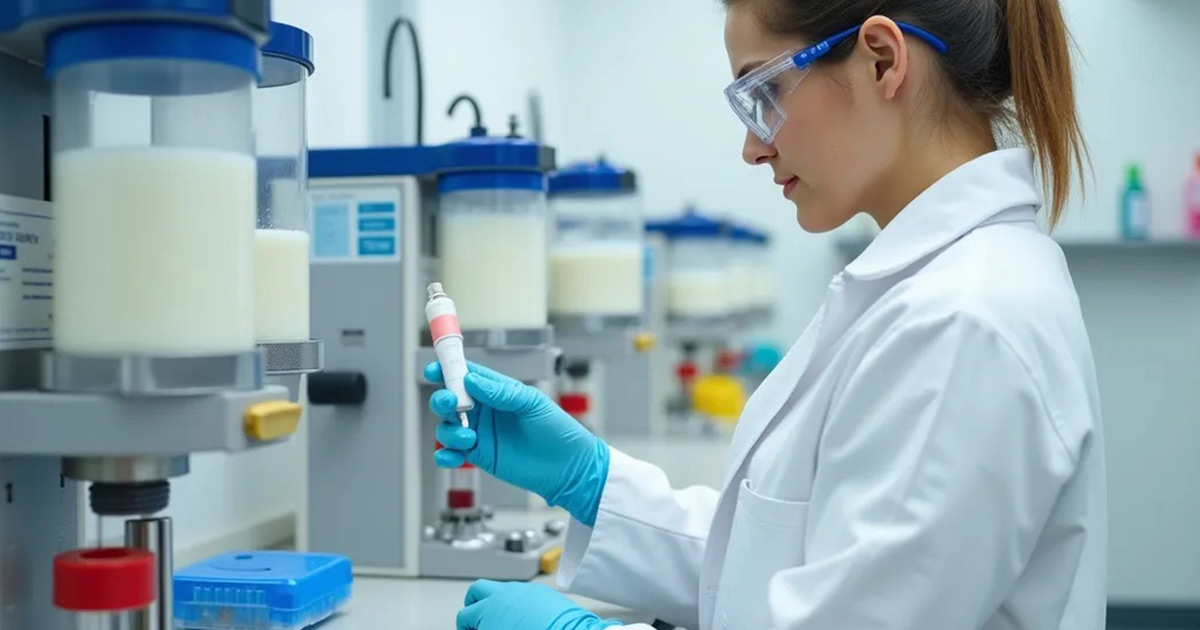
Diploma in Dairy Technology
By NCTA Team Last Updated: December 06, 2024Overview:
Dairy technology refers to the science and techniques involved in the production, processing, preservation, and distribution of dairy products. It encompasses a range of activities, including the management of dairy farms, milk processing, the development of dairy-based products like cheese, butter, yogurt, ice cream, and more, as well as ensuring the safety, quality, and nutritional value of these products.
Course Description:
Diploma in Dairy Technology is a comprehensive two-year program designed to equip students with the essential skills and knowledge required for the dairy industry. The course covers all aspects of dairy production, including milk processing, preservation techniques, quality control, and the manufacturing of a wide range of dairy products such as cheese, butter, yogurt, and ice cream. Students will also learn about dairy farm management, food safety, and the latest technologies in dairy processing.
The curriculum is structured to provide both theoretical understanding and practical experience, with hands-on training in state-of-the-art dairy processing techniques and equipment. Graduates will be well-prepared to enter various sectors of the dairy industry, including product development, quality assurance, production management, and research, ensuring that they are equipped to meet the growing demands of the global dairy market.
Applications:
- Milk Processing: Converting raw milk into safe and consumable forms like pasteurized milk, sterilized milk, and UHT milk.
- Dairy Product Manufacturing: Producing cheese, butter, yogurt, ice cream, condensed milk, and other dairy-based products.
- Quality Control: Ensuring safety, hygiene, and quality of milk and dairy products through testing and standards compliance.
- Food Preservation: Extending the shelf life of dairy products using techniques like pasteurization, refrigeration, and packaging innovations.
- Dairy Farm Management: Implementing technologies for efficient milk production and animal health management.
- Packaging Solutions: Developing packaging that maintains product freshness and extends shelf life.
- Dairy Research and Development: Innovating new dairy products, improving nutritional content, and developing eco-friendly processes.
- Nutritional Enrichment: Enhancing the nutritional value of dairy products through fortification and probiotics.
- Waste Management: Utilizing dairy waste in eco-friendly ways, such as biogas production and composting.
- Export and Trade: Ensuring compliance with international standards for global dairy product export.
- Automation and Technology Integration: Incorporating robotics, AI, and IoT in dairy processing and farm operations for increased efficiency.
- Dairy Equipment Manufacturing: Designing and maintaining specialized machinery for the dairy industry.
Responsibilities of a Dairy Technologist:
Responsibilities of a Dairy Technologist include:
- Overseeing milk processing operations to ensure safety and quality.
- Developing and improving dairy products like cheese, butter, and yogurt.
- Implementing quality control measures to meet food safety standards.
- Managing dairy plant operations and ensuring efficient production.
- Conducting research to innovate new products or improve processes.
- Monitoring and maintaining equipment for optimal performance.
- Ensuring compliance with health, hygiene, and environmental regulations.
- Supervising storage, preservation, and transportation of dairy products.
- Collaborating with marketing and sales teams for product development and promotions.
- Advising dairy farms on best practices for milk production and animal care.
- Addressing consumer feedback and improving product quality accordingly.
Course Curriculum:
This curriculum ensures students gain both theoretical knowledge and practical skills, making them well-equipped to excel in the dairy industry. Key subjects include:
Semester I:
- Overview of the dairy industry
- Importance of dairy products in nutrition
- Dairy farming practices
- Milk composition and its nutritional value
- Microbial activity in milk
- Pathogens and spoilage organisms in dairy
Semester II:
- Milk collection techniques
- Testing and grading of raw milk
- Properties and chemical components of milk
- Milk adulteration detection
- Good Manufacturing Practices (GMP)
- Hazard Analysis and Critical Control Points
Semester III:
- Pasteurization, sterilization, and UHT processing
- Techniques for extending shelf life
- Production of butter, cheese, yogurt, and ice cream
- Value-added products from milk
- Packaging materials and techniques
- Storage conditions for different products
Semester IV:
- Operations and maintenance of dairy equipment
- Energy efficiency and waste management in plants
- Basics of marketing dairy products
- Starting and managing a dairy business
- New trends in dairy processing
- Integration of automation and IoT in dairy plants
Career Opportunities:
A diploma in Dairy Technology opens up a wide range of career opportunities in the ever-growing dairy and food processing industry. Graduates of this program are equipped with the technical knowledge and practical skills needed to excel in various roles across the production, management, and innovation sectors. Below are some of the career paths available after completing this course:
- Dairy Technologist
- Quality Control Analyst
- Production Supervisor
- Dairy Plant Manager
- Food Safety Officer
- Dairy Consultant
Salary Expectations:
Salary after completing a Diploma in Dairy Technology depends on the role, organization, and level of experience. Fresh graduates can expect an average starting salary of ₹2.5 to ₹4 lakhs per annum, particularly in entry-level roles like Dairy Technologist, Quality Control Analyst, or Production Supervisor.
With experience and advanced skills, salaries can rise to ₹5 to ₹8 lakhs per annum, especially for roles like Dairy Plant Manager or R&D Specialist. Entrepreneurs who establish their own dairy businesses have the potential to earn significantly based on their venture's success.
Course Features
| Course Code | UDC-664 |
| Duration | 2 Years |
| Category | Diploma in Dairy Technology |
| Eligibility | XII with *PCB* from recognized board |
| Fees | 2x25000= 50,000 |
To know more about our this course, feel free to call us at:
+91 9733600770Ready to Enroll in This Course?
Start your learning journey today and unlock your potential!
Apply Now for This Course
